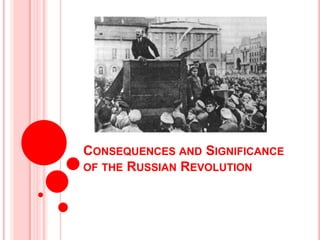
Consequences and significance of the russian revolution
- 1. CONSEQUENCES AND SIGNIFICANCE OF THE RUSSIAN REVOLUTION
- 2. SIGNIFICANCE One of the most remarkable events in human history since it set up a new way of living and thinking Dr. J.E. Swain said, "Nothing has so completely challenged orthodox theories, since the French revolutionists overthrew the Bourbons. The Russians, in a few years, have set up standards for a new way of living and thinking."
- 3. INTERNATIONAL SIGNIFICANCE It struck terror in the minds of the capitalists all over the world as the Revolution made an irresistible appeal to the proletarians. Invited the labouring people all over the world to unite against the capitalist class. A war was declared between totalitarian dictatorship and democratic socialism, between Marxism and capitalism.
- 4. SIGNIFICACNE Brought the Czarist regime to an end. In its place a Republic was established. The Revolution threw a challenge to the: values of western culture fundamental principles of trade and industry well-established systems of government social, economic and political institutions and the methods of diplomacy Thus the world was forced to re-evaluate the western values of democracy.
- 5. THE SOVIET ECONOMY The Soviet economic planning was directed towards the realization of three well-defined social goals: 1. the promotion of the material and moral conditions of the proletariat 2. the realization of the social or the common good of society by and through society 3. the securing of equal social obligations and rights.
- 6. GLOBAL IMPACT The character of the nationalist revolutions in the colonial world were given a new social and economic content. Politically, the cult of the ’common man’ was a major result of Soviet democracy. In the economic field, the conception of economic planning (Five-Year Plans) and the idea of central direction of the national economy emerged. E.H. Carr declared, "If we are all planners now, this is largely the result, conscious or unconscious, of the impact of Soviet practice and Soviet achievement."
- 7. CONSEQUENCES Divided the world into two diametrically opposed power blocs; one being the communist bloc led by the Soviet Union and the other being the anti- Communist bloc, under the leadership of the U.S. The Revolution of 1917 transformed a poverty- stricken Czarist Russia into a super power, under the guiding spirits of Lenin, Stalin and other leaders. The Bolshevik Revolution is still going on. It continually demonstrates the values that transformed a backward and decadent state into a super power of the world, within the short span of sixty years. It attracts many more millions of Southeast Asia and the Middle East.
- 8. BUT... WHY DID RUSSIA LOOK SO DIFFERENT FROM MARX’S IDEAS?
- 9. MARXISM VS. LENINISM Believed humanity was changing, Industrialization was to blame. Horrified by working conditions. Capitalists were getting richer than workers creating a significant gap between the two Believed one of the following would happen: Rich must distribute wealth A worker led violent revolution
- 10. MARXISM VS. LENINISM Lenin was fascinated by industrialization, wanted to bring that to Russia Differed from Marx in his belief that the world wide communist revolution had to be led by a power elite forcing it forward – not just the common man. Communist Party was the only party allowed. The use of force and terror through the secret police (Cheka) was necessary and good for the cause Used slogans, include “Bread, Land, Peace and All Power to the Soviets.”
- 11. WHAT HAPPENED AFTER THE REVOLUTION?
- 12. LENIN’S DEATH Died in January 1924. Believed Leon Trotsky should replace him as leader. Trotsky had successfully lead the Red Army against the White Army. Had a vision of the Soviet Union in line with Lenin. He wanted to focus on agriculture. Lenin believed that Stalin could not handle the power that came with leadership. Stalin believed in the industrialization of the nation.
- 13. STALIN’S RISE TO POWER Lenin wrote his Last Testament and wanted it to be read at the Twelfth Party Congress to delegitimize Stalin Stalin and his allies had it blocked Blamed the death of a higher up official on Trotsky and purged the country of his supporters and any other enemies, leaving him in power Trotsky would flee to Mexico where he would continue to criticize Stalin from afar and it is believed that Stalin had him assassinated in 1940
